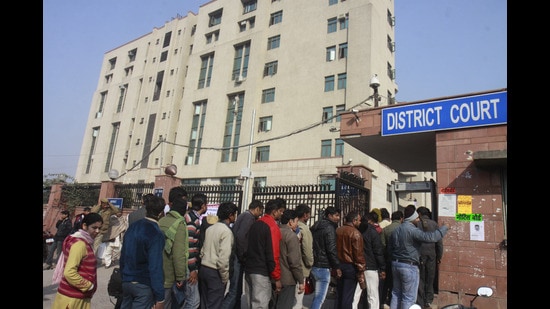Jul 04, 2024 09:14 PM IST
By drawing attention to the experience of the accused during remand, we hope that institutional barriers to the protection of constitutional rights are addressed
The Indian Constitution mandates, under Article 22(2), that a person arrested has to be produced in front of a magistrate within 24 hours of arrest, providing an opportunity for a judicial magistrate to inquire into the life, liberty, safety and dignity of the accused. This first step in the criminal justice system, termed first production, has life and death consequences for the accused. The magistrate also authorises further detention in police custody or judicial custody (jail) and oversees police investigation through remand hearings. Yet first production and remand in the magistrate courts have been understudied, given the inordinate focus on the higher judiciary, particularly the Supreme Court.

A recent report by Project 39A, National Law University, Delhi, authored by us, brings attention to the significant role of the magistrate at this stage, drawing from observations in Delhi courts over a period of three months. In a striking incident before a duty magistrate’s court, a young Muslim man accused of theft was brought in for first production with visible injuries. The accompanying case file had the two most important documents, linked to the protection of liberty and safety of the accused that the magistrate examines at this stage — the arrest memo and the medico-legal certificate (MLC). The arrest memo has details of the time and place of the arrest and the proof of intimation to the family. The MLC is a document created after a medical exam and is placed before the magistrate at first production and during subsequent productions from police custody. The accused’s lawyer raised the issue of the police beating the accused. When the magistrate asked the accused about it, the policeman standing next to the accused intervened and stated that the accused was beaten up by the public. When the magistrate asked the accused directly, he said publicne bhi maara (the public also beat me). While clearly, the magistrate examined the documents and even interacted with the accused, it is unclear whether this was adequate probing of the possibility of police violence, which is necessary to ensure the safety and dignity of the accused.
This first of its kind study, titled Magistrates and Constitutional Protections: An Ethnographic Study of First Production and Remand in Delhi Courts, was conducted across all six district court complexes of Delhi — Dwarka, Karkardooma, Rohini, Saket, Tis Hazari and Patiala House. Researchers focused on the role of multiple court actors — magistrate, court staff, lawyers, police, the accused and their families — and observed the manner in which courtroom dynamics and social hierarchies mediated the experience of the accused during first production and remand. These are aspects that do not necessarily make their way into the written record or case documents. Besides checking the paperwork, these proceedings are an opportunity for the magistrate to publicly verify its contents through interaction with the accused, lawyers, police and even the family of the accused. This oversight is meant to ensure accountability in police functioning during investigation.
We found that magistrates rarely interacted with the accused to ascertain their well-being beyond a brief query. The MLC produced before the magistrate court notes the physical condition of the accused. The examination of the MLC, however, was rarely taken as an opportunity to probe the origin of the visible injuries and confirm whether they were caused by the police or the public, accidentally or intentionally. Magistrates also did not necessarily ensure the continued well-being and treatment of the accused in custody. In fact, while the accused brought for first production always had the MLC, those coming from judicial custody did not seem to have any such requirement of an MLC to ensure their continued safety. The researchers did not observe any mention of an inspection memo or a record of injuries/condition of the accused on arrest.
Perhaps the most surprising limitation observed in this context, unmentioned in the jurisprudence, statute and remand hearings, is that the accused are produced from police custody by officers from the same police station investigating their case. In the case mentioned here, for instance, the magistrate asked him whether he was beaten up by the police while the officer investigating his case was standing right next to him. The accused, at that point, is not sure whether he might be sent back to police custody for further detention. There is thus no separation between the investigating officers and the accused at this stage to create an environment where the accused feels safe to raise their concerns about possible police violence. There appears to be a lack of recognition of the vulnerability of the accused in custody at this stage.
Undoubtedly, there is variation in the behaviour of magistrates across different courts, but a lot currently depends on their discretion, and whether first production and remand are adequately accounted for in the magistrates’ work day. The onus is currently on the accused and their lawyers to point to the illegalities of arrest and the need to protect the dignity and safety of the accused in custody entitled under Article 21 (on life and liberty).
By drawing attention to the experience of the accused during remand, we hope that institutional barriers to the protection of constitutional rights are addressed and procedural safeguards such as the MLC are used fully to ensure the safety of the accused.
Jinee Lokaneeta is professor in Political Science and International Relations, Drew University, and Zeba Sikora is senior associate, Project 39A, National Law University, Delhi. The views expressed are personal
Story Saved


